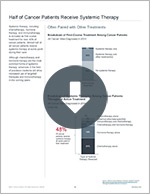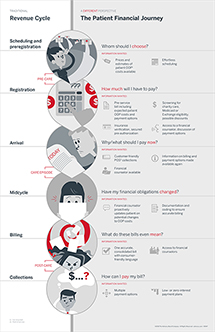Auto logout in seconds.
Continue LogoutHospitals across the country are investing in CAR T-cell therapy, an innovative cancer treatment that utilizes a patient's own cells to fight their cancer—but many are finding it difficult to get reimbursed by insurers for the treatment, Ike Swetlitz reports for STAT News.
Learn about immunotherapy—and 7 other innovative technologies
'We have not been paid'
To date, FDA has approved two CAR T-cell therapies: Kite Pharma's Yescarta to treat certain adults with aggressive forms of the blood cancer non-Hodgkin lymphoma, and Novartis' Kymriah to treat B-cell acute lymphoblastic leukemia in children and adults up to age 25 for whom other treatments did not work.
According to Swetlitz, about 130 U.S. medical centers are equipped to offer the lifesaving treatments. But some hospitals performing those procedures, such Virginia Commonwealth University Massey Cancer Center, say they're facing a financial problem: They aren't being reimbursed by insurers—at least not yet.
For example, Penny Trentham, the VP of managed care and payer relations for VCU Health, said VCU Massey Cancer Center has performed four CAR T-cell treatments so far, and they're still waiting for payment.
"We've not been paid on those, and it's been several months," she said. "It doesn't mean there's a problem, necessarily. These are very complex claims. But we have not been paid."
The complex billing system
Part of the reason those claims are so complex, Swetlitz reports, is because Medicare—which usually sets the stage for how private insurers will reimburse a treatment—is still determining when it will pay for CAR T-cell treatments, and how much it will reimburse. In the meantime, Medicare is paying hospitals based on the average cost of care for a bone-marrow transplant, plus up to $186,500 to offset the cost of the drug. For outpatient procedures, Medicare covers the entire cost of the drug plus 6%.
While it's unclear exactly how much Medicare is currently paying for inpatient treatment, medical professionals told Swetlitz that it's unlikely the reimbursements fully cover both the drugs' cost, which start at $373,000, and the cost of inpatient care. A CMS spokesperson said that reimbursement data would be released in the spring.
Hospitals and private insurers, meanwhile, have been striking one-off arrangements that can take months to settle. According to Swetlitz, hospitals struggle to estimate the true cost of treatment because they can't predict how the patient will respond to the drug and if they will need additional care for adverse side effects.
One issue is that CAR T-cell therapy remains relatively rare, with data from drug manufacturers suggesting that fewer than 2,000 patients have undergone the treatments. "[U]ntil we get more experience with this treatment protocol, it's hard to say that we would be willing to accept as a defined payment term," Trentham said. "Literally, you should do hundreds of cases before you draw a conclusion. We've done four."
The hospital is making progress in striking deals with insurers. A hospital spokesperson told Swetlitz that VCU Massey Cancer Center has reached a deal to cover the therapy with every insurer they've worked with.
John McCarty, director of Massey's cellular immunotherapeutics and transplantation program, said the hospital-insurer discussions become easier once they've set up an agreement for the first patient. Each time the insurer approves a new patient, the process gets a little faster, he said.
But that doesn't mean the hospitals will get fully reimbursed, Swetlitz writes. Even if an insurer will cover the procedure, that doesn't mean they'll pay the hospital the full amount it costs to treat the patient, John Wallace, a spokesperson for Massey said. "No two cases are identical," he said. "Based on the potential complexities of caring for these patients, we cannot accurately estimate how much care will cost and we have not treated enough patients to provide an average cost."
Trentham was not able to disclose the amounts insurers have agreed to pay the hospital under the custom CAR T-cell arrangements, and the payments remain pending.
"I don't know [if] these claims have even been adjudicated," Trentham said. She added, "The way we structured the single-case agreement, that was our hope, was that we would break even. Given the complexity of health care reimbursement, I would anticipate that there are going to be a lot of questions from the payer. They're going to want additional records. It's not going to be a simple claim that flies through."
But Trentham also said she's not worried yet. "It's not uncommon for a complex claim to be slower to pay," Trentham explained. "I would not conclude that there's any problem."
Mounting uncertainty
Joanna Hiatt Kim, VP of payment policy and analysis for the American Hospital Association, said other hospitals also have entered one-off arrangements with insurers to cover the full cost of the drug, but whether hospitals will recoup enough money to sustain their CAR T-cell programs remains "an open question," Swetlitz reports.
"One of our biggest concerns is not necessarily this CAR-T, it's all the ones coming down the pike that we see, because sustaining a loss on 10 patients a year is doable, [but] sustaining a massive loss on thousands of patients a year is not, quite frankly," Hiatt Kim said.
CMS Administrator Seema Verma acknowledged in a recent speech that Medicare's current payment system for CAR T-cell isn't working. "The CAR-T story is an example of how government programs often fail to keep pace with innovation," she said.
A spokesperson for CMS said the agency "is working within our statutory authority on payment approaches for CAR T-cell therapy to ensure access to care" (Swetlitz, STAT News, 3/12).
Learn about immunotherapy—and 7 other innovative technologies
Our new report explores the clinical technology pipeline to help health care leaders become more conversant in the major vectors of innovation, leading applications of new technologies, and the business implications for established providers. Read on to unpack the new innovation agenda.
Don't miss out on the latest Advisory Board insights
Create your free account to access 1 resource, including the latest research and webinars.
Want access without creating an account?
You have 1 free members-only resource remaining this month.
1 free members-only resources remaining
1 free members-only resources remaining
You've reached your limit of free insights
Become a member to access all of Advisory Board's resources, events, and experts
Never miss out on the latest innovative health care content tailored to you.
Benefits include:
You've reached your limit of free insights
Become a member to access all of Advisory Board's resources, events, and experts
Never miss out on the latest innovative health care content tailored to you.
Benefits include:
This content is available through your Curated Research partnership with Advisory Board. Click on ‘view this resource’ to read the full piece
Email ask@advisory.com to learn more
Click on ‘Become a Member’ to learn about the benefits of a Full-Access partnership with Advisory Board
Never miss out on the latest innovative health care content tailored to you.
Benefits Include:
This is for members only. Learn more.
Click on ‘Become a Member’ to learn about the benefits of a Full-Access partnership with Advisory Board
Never miss out on the latest innovative health care content tailored to you.



